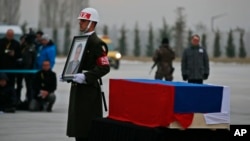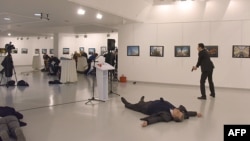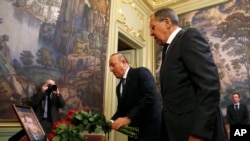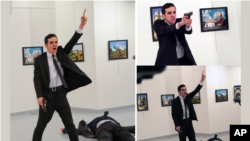The Russian and Turkish presidents say the assassination of Russia's ambassador to Turkey will not harm ties between the two countries.
"We share the same understanding with Mr. Putin that our expanding areas of cooperation with Russia, particularly on Syria, will not be hampered by this attack," Turkey's Recep Tayyip Erdogan said in Istanbul after the two leaders spoke by phone late Monday, the French Press Agency reported.
The two countries' foreign ministers laid flowers Tuesday at the portrait of Ambassador Andrei Karlov in Moscow. He was shot and killed by an off-duty policeman Monday in an apparent protest against Russia's involvement in Syria.
Karlov's body arrived in Moscow later Tuesday, accompanied by his widow.
Turkey's Foreign Minister Mevlut Cavusoglu said the "Turkish people are mourning this loss as much as Russia and the people of Russia." Cavusoglu was in Moscow along with the foreign minister of Iran to discuss the Syrian crisis.
The three foreign ministers agreed to facilitate a deal between the Syrian government and the opposition, Russian Foreign Minister Sergei Lavrov said after their meeting.
‘Don’t forget Aleppo’
Karlov's killer shouted "Don't forget Aleppo! Don't forget Syria! As long as our lands aren't safe, you will not be safe!" at the scene, one witness told VOA.
Analysts say that for now, Turkey and Russia recognize they need to cooperate on working toward a resolution of the Syrian civil war. “There is a mutual inter-dependency at the moment over Syria,” says Sinan Ulgen, visiting scholar of the Carnegie Institute in Brussels.
Russian President Vladimir Putin condemned the killing as an act of terrorism.
"There is no doubt that the committed crime is a provocation aimed at ruining Russian-Turkish relations and the peace process in Syria, which is moving forward with the help of Russia, Turkey and Iran," Putin said Monday. "The answer is to strengthen the counter-terrorism efforts and the criminals will feel that soon."
Putin demanded to know "who directed the killer's hand," and asked Turkey to step up security at Russian diplomatic posts.
Erdogan also called the killing a "provocation" and said "Turkey and Russia have the will not to be deceived."
But as the countries continue to work together on the investigation as well as efforts in Syria, fears that this "provocation" will take root are waning, according to some experts.
"For a while now Turkey and Russia had agreed on many issues in northern Syria, including evacuation of civilians from eastern Aleppo, and this convergence could be undermined by the assassination attempt but I think that will not happen," TWI Turkish Research Program Director Soner Cagaptay told VOA Turkish. "At this stage for Russia to act aggressively on this assassination issue would mean that Russia would lose what it has, so I think...Turkey will respond by running a thorough investigation of the assassination."
“Russia has being giving Turkey the benefit of the doubt because of the broader interests developing the region regarding Syria and Iraq,” suggests political columnist Semih Idiz of the Al Monitor website. “As you see now, Russia has brought Turkey to its side. It's trying to capitalize on the deepening division between Turkey and the West, and it sees an advantage in this and it would not want to endanger [this relationship] at this moment in time.”
Captured on video
Ambassador Karlov was delivering a speech at the opening of a photo exhibition as the well-dressed gunman stood on the side of the stage, leading many in the audience to assume he was a bodyguard.
The entire scene was captured on video.
Three other people were wounded before security officers shot the gunman dead. Karlov died at a hospital. He had been Russia's ambassador to Turkey since 2013.
Ankara Mayor Melih Gokcek identified the assassin as a 22-year-old police officer, Mevlut Mert Altintas.
Turkey's state-run Anadolu news agency said six people have been detained in connection with the investigation, including the roommate, parents and other relatives of Altintas.
White House spokesman Ned Price said the U.S. strongly condemns the assassination and sends its condolences to the victim's family and to the Russian government and people.
"This heinous attack on a member of the diplomatic corps is unacceptable and we stand united with Russia and Turkey in our determination to confront terrorism in all of its forms."
One Turkish official said there are "very strong signs" the gunman was a follower of Muslim cleric Fethullah Gulen, who lives in exile in the United States and is suspected of helping direct July's failed coup in Turkey. But a Gulen spokesman denied the cleric had anything to do with the assassination.
Ties between Russia and Turkey have been slowly improving since Turkish jets shot down a Russian bomber that Ankara said strayed into its airspace from Syria last year.
Mehtap Colak Yilmaz of VOA Turkish contributed to this report.








